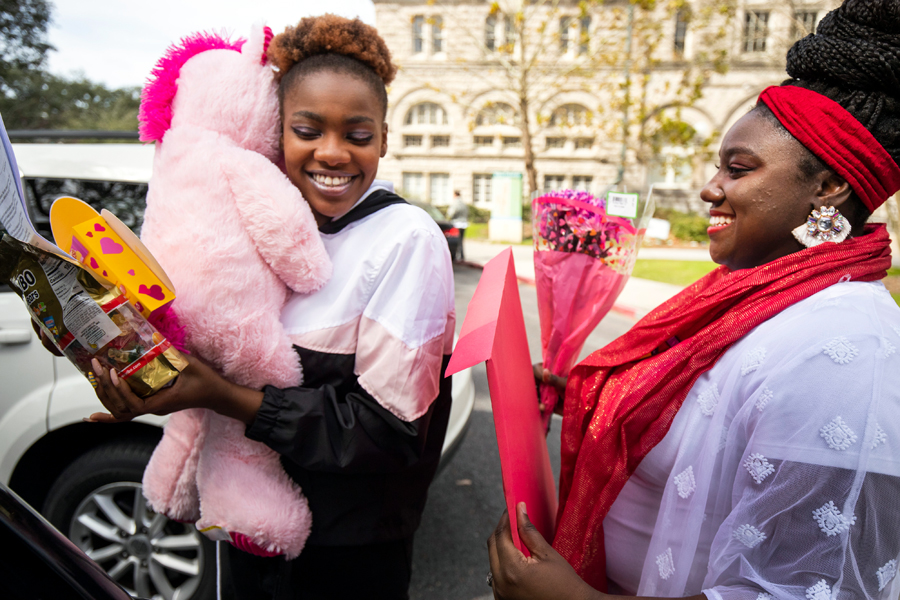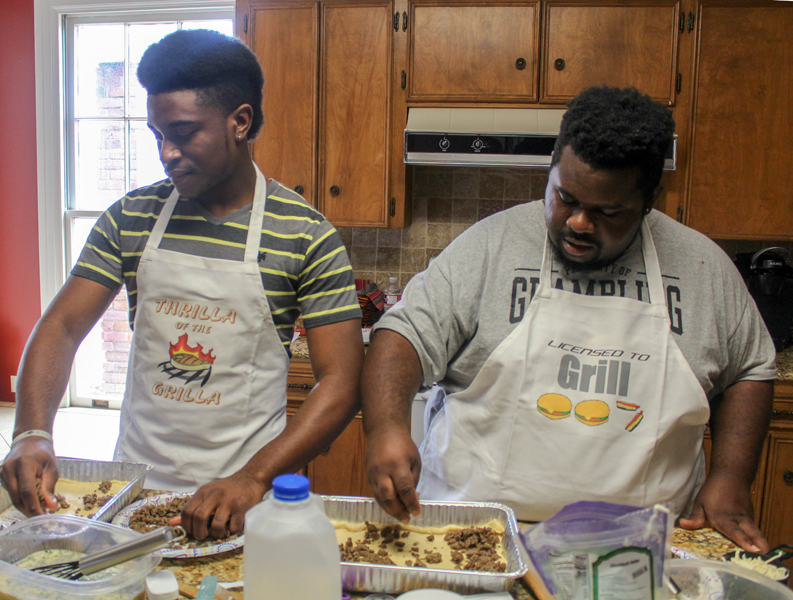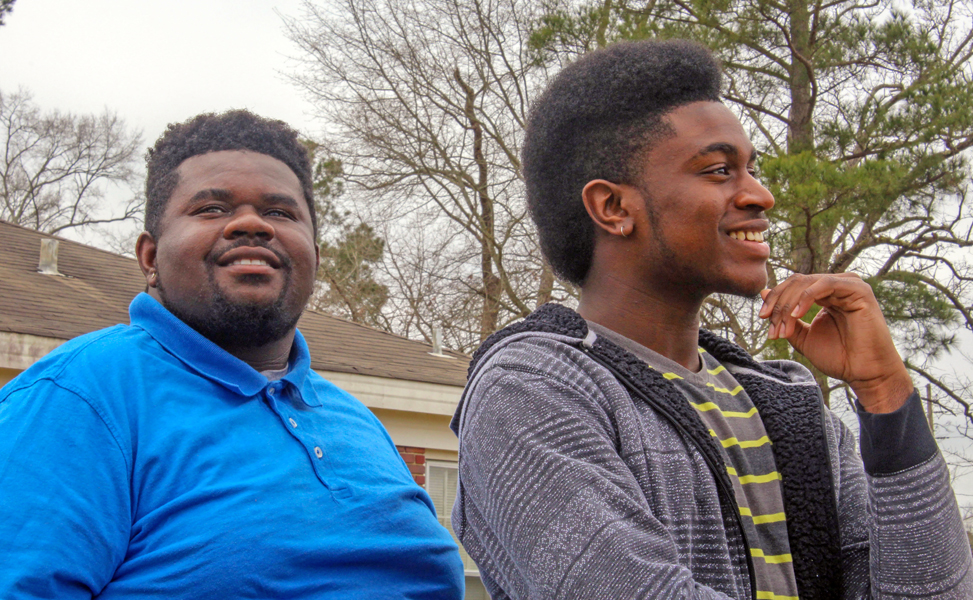
Sophie Germer
Kayana “Keedy” Bradley showered her little sister, Breayana “Bree” Bradley, with Valentine’s Day gifts on the campus of Tulane University, where Bree is a student. They call themselves “the three-percenters,” to emphasize the slim proportion of Louisiana youth in foster care who will graduate from college. “How do we get to higher education when the fundamentals are not even there?” Bree Bradley asked. “It’s a miracle that any of us make it out of college.”
Move over oil and gas power brokers. Take a seat, criminal justice advocates. The most influential lobbyists in Louisiana’s statehouse may be a small group of youth formerly in foster care.
The young people first came to the legislature in Baton Rouge as part of a fledgling internship program through the nonprofit Louisiana Institute for Children in Families. But they are expected to be clutch players this session, as the legislature debates the extension of foster care beyond age 18.
On Tuesday, the Task Force on Extending the Age of Foster Care to 21 releases its recommendations about the policy and programmatic changes necessary to expand care, which carries a roughly $3 million annual price tag for the state.
Gov. John Bel Edwards joined with the Department of Children and Family Services (DCFS) and state Sen. Regina Ashford Barrow, a Democrat, to create the task force, a move bolstered by the interns. Or, as the governor wrote in an email, he and his wife, Donna Hutto Edwards, “had an opportunity to meet the foster-youth interns who worked in the capitol and were even more encouraged that extending the age is the right thing to do, based on the information shared by the students.”
Last year, the newly elected Sen. Ryan Gatti, a Republican, also became a fan of the group of youngsters after he introduced Senate Bill 129, which allowed youth in care to stay in care until they’d graduated from high school, instead of cutting them from the rolls at age 18.
Gatti believes his bill became law solely because of testimony from youth formerly in foster care. “It would not have passed if they hadn’t have shown up,” he said.
Admittedly, the bill was a tough sell in an extremely tight fiscal year because it required $948,000 of state money annually, which then draws down $3 million in additional federal funds. But Gatti’s bill made it through Senate committees and landed in the House Appropriations Committee in May, at the height of the legislative session.
That morning, the committee’s chair, Rep. Cameron Henry, a Republican, took one look at the day’s whopping agenda and asked everyone to curtail testimony.
So when Gatti’s bill was called, he walked to the front table accompanied only by DCFS Secretary Marketa Garner Walters. Foster parents and children had testified for the bill on the Senate side, he told Henry. “They’re all here today, but they’ve agreed not to testify, because I know we’re in a crunch for time,” Gatti said.
Up at the dais, Henry nodded, then said, “Keedy can testify. The girl sitting behind you can testify.”
Gatti did a double take. “OK …” he said.
Henry continued: “She was one of the interns last session, correct? C’mon up here.”
University of New Orleans honors student Kayana “Keedy” Bradley walked up to the microphone with a sheet of notes. “Hi, everybody,” she said, confidently. “Thank you for letting me talk.”

Kaderra Hilts
Jarvis Spearman, right, 24, is getting his master’s degree in social work from Grambling State University, working two jobs and raising his brother, Kewuan Spearman, 17. On weekends, the two of them often cook breakfast together.
The experts
Bradley boiled down the issue, complete with statistics about youth who automatically aged out of care at age 18. “According to the Louisiana legislative task force — your own task force — of youth who age out of foster care, only 50 percent will receive a high school diploma by the age of 19,” she said. “Only 3 percent will earn a college diploma by age 25. Three out of five will be homeless within a year of aging out. Three out of four of these youth will be incarcerated at some point in their lives. And the employment rate for youth who age out is 50 percent.”
Bradley reinforced her statistics with examples of why this extension was important for youth across the state and for her personally, concluded and thanked the committee.
Henry nodded at Bradley. “Perfect. Good to see you again,” he said, asking for votes. “Seeing no objections, Senate Bill 129 is moved favorably,” he said.
Bradley doesn’t remember the exchange as anything unusual. “It just seemed to me that legislators might want to hear the voice of someone who’s impacted by a bill that’s on the table,” she said.
Secretary Walters recalls that moment as “a delight.” For her, Henry’s acknowledgement of Bradley was made more poignant because she knew that the committee chair, who had lunched and talked with the interns, knew what it took for Bradley to be there: to make it to legislative committee meetings in Baton Rouge, Bradley boarded a bus in New Orleans at the crack of dawn.
National foster care expert Kate Gaughen, who worked in partnership with the Annie E. Casey Foundation on the new task force report, saw similar groundswells in Georgia and Michigan after youth got involved in legislation there. “I think they really bring a face to it,” she said. “There’s something about having an 18-year-old stand in front of you, especially if you have your 18-year-old at home: ‘This could be my kid.’ It really builds empathy.”
In Louisiana, the Institute for Children in Families debuted its legislative internships in 2017, based on the much larger Foster Youth Internship Program that’s been operating in Washington, D.C., since 2003 through the Congressional Coalition on Adoption Institute.
Though the program operates on a small scale, only producing seven interns in two years, Walters believes that it’s had an impact. “It’s changed the tenor of the conversation,” she said.
‘The three-percenters’
Two years ago, the state of Louisiana was done with Breayana “Bree” Bradley, 20. It was her 18th birthday. “I was given a blue folder with my Social Security card, birth certificate, some medical records and immunization paperwork,” she said. “Literally, it was, ‘Bye, Bree,’ and that was the last I saw of them.”
Bradley is now enrolled in college, like the rest of the interns, including her older sister Keedy Bradley, who’s now 22. Four of seven interns came through a promising program run by New Orleans Court-Appointed Special Advocates, one of the few CASA programs in the nation to offer one-on-one support to children in care as they transition out of state care at 18.
To date, 75 percent of the program’s youth are enrolled in school or a job training program and 100 percent of high school graduates have moved on to college. Those results far surpass what’s been typical for older foster youth.
The interns call themselves “the three-percenters,” to emphasize the slim proportion of Louisiana youth in foster care who will graduate from college, according to state estimates.
“Higher education is definitely a big deal,” Bree Bradley said. “But how do we get to higher education when the fundamentals are not even there? It’s a miracle that any of us make it out of college.”
Nationally, the proportion of graduates is likely in the single digits, though data is unreliable.
That’s especially true in the 24 states that don’t expand care beyond 18 or high school. In those states, no school or state agency even knows which college students were formerly in the foster system, much less tracks them. There’s clearly a link, said Gaughen, the national expert. “Without extended care, only the most exceptional students make it through post-secondary education,” she said. “Sometimes kids are able to enroll, but their graduation rates are abysmal.”
Research from the University of Chicago’s Chapin Hall found that when foster youth are allowed to stay in care beyond age 18, they do better overall and are twice as likely to attend college. In a state where workers without post-secondary education or training often languish in lower-tier, low-wage service industry jobs, officials in Louisiana hope for similar educational outcomes.
In some ways, it was a long shot for Bree Bradley to end up in college at all, since she had 20 different placements while she was in care, making it hard for her to keep up with academics or athletics. “For the longest, I did not think I was going to college,” she said. “I worked and I strived for it. But did I really see that in my future? No.”
The two Bradley sisters entered care when they were in their early teens and their mother suffered a stroke, leaving her unable to care for them.
The two sisters are inseparable and protective of each other after years of being separated within the system. Together, with the help of some caring adults, they got through the system and into college — but many equally talented kids don’t, they say.

Kaderra Hilts
Jarvis Spearman, left, says, “I know when someone is really there to help me.” Legislative interns soon learned to focus on the people from both parties who were truly sincere. “You’re not going to be able to fool a foster kid,” he said. His brother, Kewuan Spearman, is on the right.
‘Not replicable’
All interns interviewed for this story feel that reality tug at them, even as their own narratives are celebrated in the chambers of the capitol. “Yes, the success stories could grow more if Louisiana extends care, because kids can live for the future instead of living day-to-day,” said Ian Marx, a second-year intern who attends the University of Notre Dame on a Posse Scholarship. “But the stories we have are so lucky, they’re not replicable. The fact that I’m here at Notre Dame is an anomaly.”
Bree Bradley, also an excellent student, also won an all-tuition Posse Scholarship, but can’t afford the room and board to live on the campus of Tulane University, where she attends and is majoring in anthropology, with an eye toward going to law school.
So Bradley pays rent to live with a friend’s family an hour’s bus ride away, across the Mississippi River. When she’s on campus, she often hears her classmates on the phone with their parents, asking for assistance with things like a meal-plan card that didn’t work at lunchtime or a paid tutor to give them an extra push on a certain subject.
“Foster kids don’t have that,” she said. “The decisions we face every day are: How do we pay our bills? How do we put food on our tables? How do we keep this roof over our heads? These are difficult questions to answer when you have no one to guide you or family to support you.”
Years ago, before the draconian budget cuts that came during the administration of Gov. Bobby Jindal, DCFS supplied some services for youth who had aged out of care. Christy Tate, child welfare manager over youth programs, remembers surveying youth back then about what they needed most when they exited care.
“We thought we’d hear that kids needed a house, a car or money,” Tate said. “Overwhelmingly, the answer was: ‘I need someone to call in my darkest hours that won’t turn me away.’ They just wanted a person.” Without extended care, the Bradley sisters have learned to rely on the staff at the CASA New Orleans office, which has become a de facto home base for the interns with New Orleans roots.
If not for an advocate from CASA who co-signed her lease, Keedy Bradley would have likely have ended up homeless four years ago — she was unable to rent her own apartment without a co-signer after she graduated from high school.
At a state level, that original eye-opening study and its findings about young people’s yearning for connections continue to shape DCFS programming, including the proposed expansion of care that will be released on Tuesday. “It doesn’t mean that they won’t struggle with the same things, but they will have a better way to struggle through them,” Tate said.
No longer invisible
A decade ago, Jarvis Spearman tried to tell his foster care caseworker that he was being beaten and starved. Other foster children being kept in the home also reported abuse, hoping their complaints would be upheld. Instead, the worker assigned to the department’s investigation said she couldn’t find fault with the home’s abuse. “You probably deserved it,” she told the children.
Spearman, now 24, is studying for his master’s degree in social work at Grambling State University, raising his 17-year-old brother, and working two jobs to stay afloat. For awhile, he worked night shifts in a plant deboning chicken. He’d came home to sleep for a few hours before getting up for 8 a.m. classes.
He usually stays mum about being mistreated. But in mid-2017, he took a rare day off, drove to the Louisiana state capitol and told legislators all about it. “I was wanting to commit suicide and I felt worthless and I just felt that I had no purpose,” Spearman testified, as he sat at a table flanked by the two Bradley sisters and the fourth intern for that year, Taylor Fletcher.
Spearman recalled the day during a recent interview. At first, he said, he and the other interns had had to pause and get their bearings. Here they were, front and center in the world of politics, where deference and politesse are a way of life. “All my life, I have been lied to and let down. I know when someone is really there to help me,” said Spearman, who said they soon learned to focus on the people from both parties who were truly sincere. “You’re not going to be able to fool a foster kid.”
The original idea behind the Louisiana Institute’s internships was to inform policy. “You wouldn’t try to fight a fire and not ask firefighters what they thought about that,” said Institute founding board member Madeleine Landrieu, the dean of Loyola University New Orleans College of Law, who became heavily involved in children’s issues during 16 years on the bench in the Fourth Circuit Court of Appeals and in Orleans Parish Civil District Court.
But there was more: Landrieu also realized that the children and families she saw needed to be heard far beyond her courtroom. “What kids in our system need is people in big places who have voices, because our kids can’t scream loud enough to be heard,” she said.
Spearman, in his testimony, advocated for extending the age of foster care to 21. “I realize that this would be a huge shift in state law, but no child deserves to have a destiny sealed by circumstances beyond their control,” he said.
Though that expansion didn’t happen during that session, something did change for him for the day that he testified, he said.
As he looked toward the dais, he saw the reaction of the committee’s chair, Sen. Regina Ashford Barrow, a Democrat, who was weeping. Barrow has a long track record of working on children’s issues in both the nonprofit sector and the legislature; she sponsored the legislation mandating the legislature task force about extended care.
Though Barrow was a seasoned professional who had long worked with children, she had also grown up in a large extended family. She always had someone to turn to. When she heard the youths’ testimony, she felt a deep pang about how it must feel to be 18 and absolutely alone in the world.
Teary-eyed, she gave all the young people her cell-phone number and told them that their testimony had changed her life. “Truly this is going to change the course of Louisiana for children who age out of foster care,” she said. “This has just changed it. It’s made the difference.”
Spearman still thinks of that day. It changed him too. “Finally, I felt seen,” he said.
This story is also being published by the Baton Rouge Advocate.
This yearlong reporting project is made possible in part by The New York Foundling, which works with underserved children, families and adults with developmental disabilities. Throughout this project, Youth Today will maintain editorial independence.



























